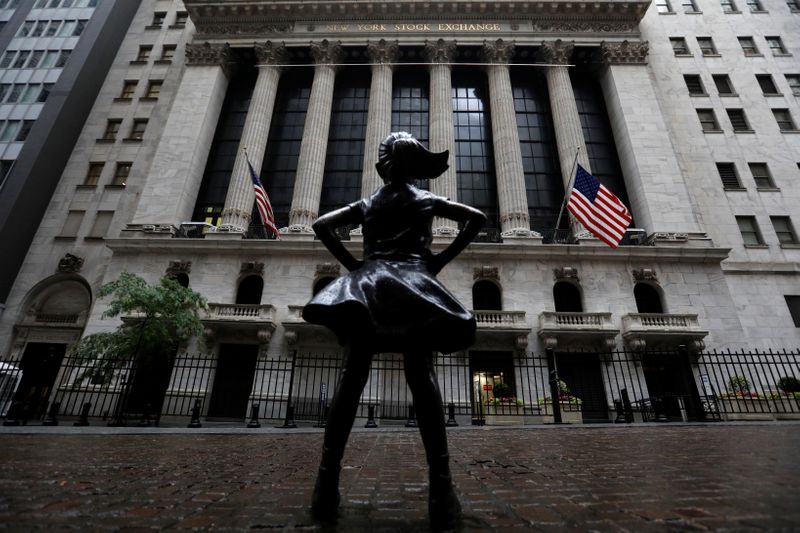By Medha Singh and Devik Jain
(Reuters) - Wall Street's main indexes were largely flat on Thursday, as gains in financial and energy shares helped recoup early losses on an alarming rise in new coronavirus cases and elevated jobless claims.
All three indexes briefly turned positive in the session, a day after posting their worst day in two weeks.
"It appears that the market may have entered into a new stage of needing direction. It doesn't seem that the worries over a virus resurgence are enough to truly start forming a down leg of a W-shaped recovery," said JJ Kinahan, chief market strategist at TD Ameritrade.
"But without some new catalyst to give market participants some optimism, stocks might not be able to move much higher either."
Spikes in novel U.S. coronavirus cases will likely trigger closures in some places but not a nationwide shutdown, White House economic adviser Larry Kudlow said, as a number of states posted a record rise in infections.
Meanwhile, data showed the number of Americans filing claims for unemployment benefits fell less than expected last week likely as hiring by reopening businesses is being partially offset by a second wave of layoffs.
The resurgence in virus cases across the United States threatened to halt a Wall Street rally that was powered by a raft of global stimulus since late March.
After coming within 5% of its record high in early June, the benchmark S&P 500 has lost nearly 6% in the past two weeks and analysts cautioned further declines amid worsening economic forecasts.
At 10:53 a.m. ET, the Dow Jones Industrial Average (DJI) was down 1.73 points, or 0.01%, at 25,444.21, the S&P 500 (SPX) was down 0.99 points, or 0.03%, at 3,049.34. The Nasdaq Composite (IXIC) was down 0.56 points, or 0.01%, at 9,908.61.
Wall Street's fear gauge, the CBOE volatility index (VIX), rose to 34.52 points.
The S&P banks subindex <.SPXBK> rose 1.7% as U.S. banking regulators unveiled a pair of rules that will make life easier for large banks with complex trading and investment portfolios.
After markets close, the Federal Reserve will release the stress test results for the lenders.
The energy sector (SPNY) gained about 0.9%, as oil prices recovered. [O/R]
Utilities (SPLRCU) and industrials (SPLRCI) posted the steepest declines among major S&P sectors.
Walt Disney Co (N:DIS) fell 2% after it delayed the reopening of theme parks due to the health crisis. A report also said the company was considering postponing the July 24 release of "Mulan".
Boeing Co (N:BA) tumbled 2.4% as rival Airbus (PA:AIR) reached a crucial jetliner production target and smoothed recent industrial problems.
Berenberg also reduced its rating on the U.S. planemaker's shares to "sell", noting elevated near-term risks linked to the pandemic, the pace of recovery in air travel and uncertainty related to production rates.
Declining issues outnumbered advancers for a 1.19-to-1 ratio on the NYSE. Advancing issues outnumbered decliners by a 1.11-to-1 ratio on the Nasdaq.

The S&P index recorded three new 52-week highs and no new low, while the Nasdaq recorded 40 new highs and seven new lows.